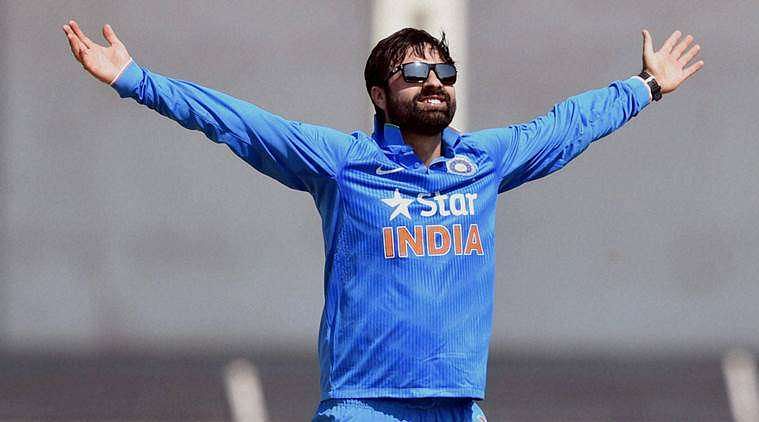
Of undying dreams and unflinching resolve - the Parvez Rasool story
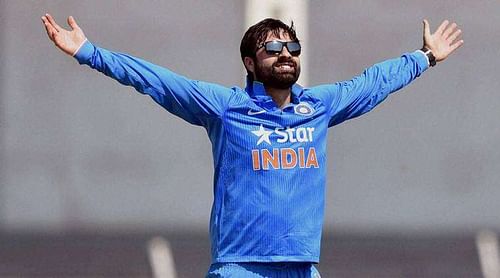
October 17, 2009.
“An under-22 cricketer from Jammu & Kashmir has been detained by the Bangalore police for questioning on suspicions of him carrying a bag of explosives to the M. Chinnaswamy stadium which is currently in the middle of hosting the Champions League T20.”
There’s something about headlines, the way they are designed, the way they are presented. They have this strange ability of stirring within you a variety of emotions, one or many at the same time.
Happiness. Relief. Anger. Disgust. Surprise. Awe. Anything.
This one touched a chord, a bit more than the others. It filled you with a massive amount of sadness. Not the sudden kind that stings you immediately and evaporates quickly, but the sort that engulfs you slowly. The magnitude of whose pain hits you, not like a flurry of left hooks all at once, but like well spaced out knockout punches.
You get that sick feeling in the stomach, wondering what would happen if this actually was the case. To an already marginalised community, to a violence-ravaged state, to our sport, to the kids to whom this sport gives hope when nothing else in life does.
And then, you turn to think of what would happen if this wasn’t true. About how an innocent 20-year-old would ever recover from spending harrowing times in police interrogation rooms, from being hailed as a potential terrorist by the national media.
This is when the pain sets in, for your heart refuses to believe that a young aspiring cricketer would have anything to do with bombs. Anything at all.
And your heart is right. He is let go without any charges, the forensic evidence proving that his bag didn’t contain any residue of the explosives, as had been previously claimed. You are relieved, but you feel further pain. Sharper pain. At how this kid’s world has turned in a matter of 48 hours, at how it will never be the same again.
His psyche was sure to have been fractured, and the negative coverage by the media would have definitely left him destroyed.
All of this, the entire incident, should have broken Parvez Rasool.
But it didn’t.
A craftsman at work
The first step is slow, the second a touch faster. The next three so hurried they create a blur. The hands move upwards and come together in a simple, yet beautiful symphony that is reminiscent of the great Graeme Swann.
This action is not an ordinary one, but a work of craft, a study in contrasts. Lower body rushing with energy, the upper body as languid, as soothing as Lennon’s voice or Ludhianvi’s poetry.
And then, on occasions, he stops. A half a second pause. It’s a trend many off-spinners follow these days to outfox the highly innovative modern day batsmen. It’s effective, this pause, but generally, breaks the flow of the action and looks ugly. Rasool’s doesn’t. He manages to transfer his knack for creating visual magic onto the pause as well. And he does so without a hint of an effort.
The ball comes out of his hand gently, yet the invisible force is there, somewhere because the revs he applies on the ball wouldn’t be possible without that. The same ball, the same serene action results in loopy, gripping and turning deliveries in long form cricket, and quick, flat and well-angled deliveries in the shorter versions.
This action has grace and class painted in bright neon all over it.
And it brings him wickets, bundles of them.
Even if it didn’t, just watching him bowl on a loop would have been worth it.
Rasool – an inspiration
There are sportspersons who are just that, sportspersons. And then there are sportspersons whose reach stretches far beyond their sport. They are towering figures, inspirations to many. Their importance is felt outside the realm of their sport as much as within it.
They give hope to hordes, to entire communities of people. Hopes of living the dream they dream. And belief, that if they can, so can the others who have come up from similar environments.
Rasool is not just a cricketer. He is an inspiration in the correct sense of the word, not the way it’s floated around for all and sundry these days. For the people of the Valley, he’s their hope. The epitome of their dream.
This burden of dreams and hopes that Rasool carries should have taken a great toll on him, on his cricket.
It would have on anyone else. But it doesn’t on him.
Praise from the best
The legendary Bishan Singh Bedi is known to have a wonderful eye for talent, especially when it comes to spin bowling. He is also a very hard taskmaster and thus only talks highly of players never shy of working hard. He was appointed coach of the J&K Ranji Trophy team before the 2011-12 season in a bid to give cricket an impetus in the region.
At this stage, Rasool was not an exceptional performer. He was only known as the terror suspect from 2009. Nothing else.
After the first few training sessions and a couple of games, Bedi came out and stated that Rasool is the best spinner J&K has ever seen and will go on to play for India in the future.
For untrained, unexceptional eyes like ours, this was an unfathomable statement, if indeed we paid any attention to it. For Bedi, it was just an instinct, a gut feeling that was driven by the magnificence or the potential of magnificence that he saw up close.
Rasool, meanwhile, has gone on to say that Bedi was instrumental in transforming his bowling.
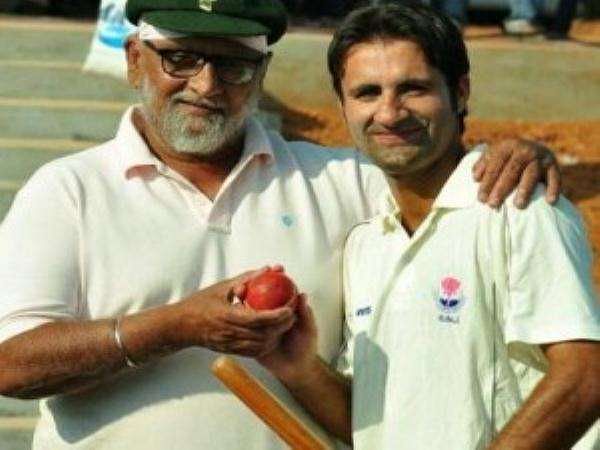
Bedi did that, and he did a lot more. He helped Rasool break away from his identity as a ‘has been terror suspect’ and forge a new one, as a hero to the people of the politically disturbed region of the Kashmir Valley.
Also read: Battle-hardened by struggle, comeback-man Parvez Rasool's dream lives on
Rasool flourished under Bedi and had, in 2012-13, a season of dreams.
33 wickets at 18.09 in seven matches. 594 runs at 54 with two centuries. Third highest wicket taker amongst spinners. Highest run scorer and wicket taker for his state.
The selectors were forced to look towards an area that was once dismissed without as much as a batting of an eyelid, so confident were they that an international quality cricketer could not emerge from such a region.
But Rasool was different. He had always been.
Bedi knew that. We didn’t.
Humble beginnings
Bijbehara, where Rasool grew up, is a small town about 50 kilometres away from Srinagar. It’s an area known for bat manufacturing. And yet, strangely, it has little else to do with cricket. They don’t have any turf wickets there, and even matted ones are hard to find.
In order to stand any chance of improving his game, Rasool had to undertake the arduous journey to Srinagar every day. All this just so he could bowl on a real cricket pitch, no matter the quality.
But even the capital city of Srinagar couldn’t offer much more than that. There were a lack of coaches whose brains he could pick. There was the poor infrastructure that is characteristic of cricketing backwaters. There was the weather, the famous Kashmir snow which prevented any cricket from happening during the winters.
And then there was the frequent unrest in the region that regularly halted daily life.
Such was the struggle, most would have given up and settled for something less. But not Rasool. It was just not in his nature.
First real opportunity
After the magical run he had in the 2012-13 Ranji Trophy, Rasool left the selectors no choice but to try him out at a greater stage, his chance coming in a warm-up game for the Board President’s XI against the touring Australians in early 2013. And in that game, he bowled a ferocious spell to end with 7 for 45 from 28 overs. This ensured an IPL deal with the now defunct Pune Warriors and selection for India’s ODI tour to Zimbabwe immediately after that.
This was it, the moment he had worked so hard for all his life. The moment that made every ounce of the struggle worth it. The moment that cannot be described by anyone but the man who went to hell and back, in his quest for it.
The excitement of his selection was palpable. It got people talking - in person, on TV and on social media.
They spoke about his bowling, his stats, about how his batting could be a valuable asset. They spoke about the little they knew about his story, what it would mean for J&K to have one of their own playing for the country. They spoke about him, about Parvez Rasool - Indian cricketer, not suspected terrorist.
It must have felt good, very, very good.
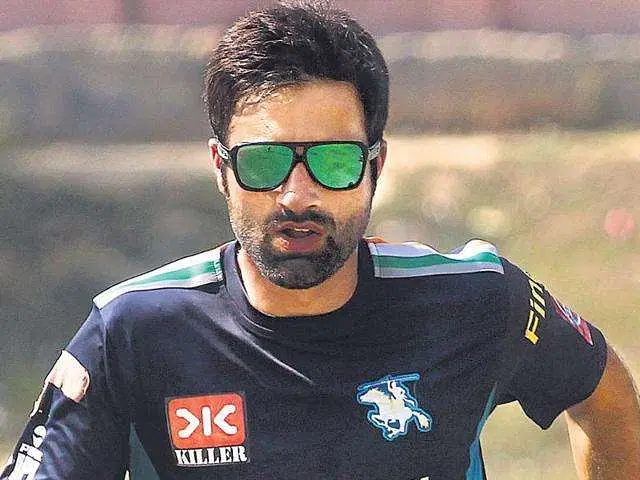
But the nature of joy, in general, is such that it doesn’t last too long. And this was no different. In Zimbabwe, India went with a second string squad and Virat Kohli was leading them in a full series for the first time. India was carrying five uncapped players and four of them made their debuts at various stages during the tour.
Rasool was the one who missed out, the only one among the fifteen to not get a game. Kohli justified his decision to bench him by saying he wasn’t fitting into the team combination. At that stage, it didn’t matter what he said.
We had wanted to watch Rasool play for India, and the fact that he came so close and then missed out stung the most. But that’s just how cricket goes. We, the ardent followers of the game, know that. It’s just that the emotion was so much that we didn’t want to accept it.
The then J&K chief minister Omar Abdullah couldn’t hide his displeasure and tweeted that if they didn’t intend to play Rasool, they shouldn’t have taken him along and broken the hearts of many who were waiting for him to don the national colours.
We let emotion overcome us. Omar Abdullah let emotion overcome him. Our spirit was dampened, his spirit was dampened.
But not Rasool’s.
As with everything else, he took it in his stride and carried on. Like he always does when life turns it’s back on him.
And coming up as it did against the sheer volume of the determination that was characteristic of him, even destiny wasn’t strong enough to deny him an Indian cap, which duly arrived in Bangladesh nine months later.
His selection in the team for this tour didn’t attract the kind of reaction it did on the previous one, the well-wishers not wanting to get their expectations up only for them to be shattered and be subject to the kind of hurt they were the last time around.
But when, on 15 June 2014, Rasool finally became an international cricketer, the pride, the happiness and the glee couldn’t be hidden from our faces.
And especially from the people of the Valley. For this was one of their own telling them to dream, showing that there’s nothing which can’t be achieved, if they keep at it and pursue their dream, even when it seems unrealistic and laughable.
It was inspirational stuff, this. The kind that gives you goosebumps, sends shivers down your spine and makes you cry a silent tear when no one's looking.
Rasool was decent on debut, picking up a couple of wickets for 60 runs from his full quota of 10 overs. But before you knew it, the game was over. He was benched for the next two. And then dropped. He slipped way down the pecking order. Other, more exciting spinners came up and kept knocking on the selector’s doors.
Rasool got lost. And that was probably it for him.
Only he didn’t believe that.
He never would.
Remarkable domestic season
J&K finished in the bottom three amongst 27 teams in the 2012-13 Ranji Trophy.
Rasool had a remarkable year, which led to his national selection, but him alone couldn’t make an entire team.
The following season, they made the quarter-finals after 12 long years. They did so with just one ground and no winter nets.
When former captain Samiullah Beigh was asked what changed during the off-season, he said they were inspired by Rasool’s rise. That their players now had additional motivation knowing that if they perform well, the selections and IPL contracts, which had so far eluded them, would come.
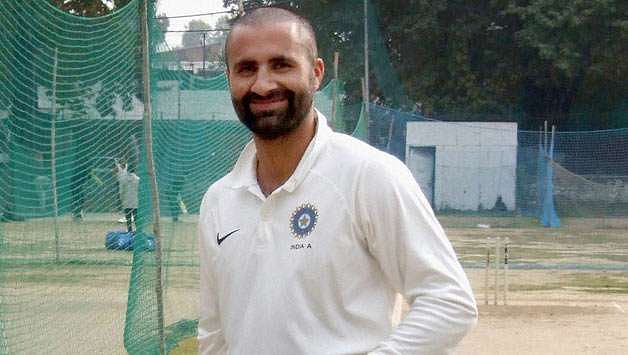
Like with a lot of things, even here, Rasool gave them that belief, he gave them hope. And even though he couldn’t make an entire team, he did carry one on his shoulders.
The quarter-final is the biggest testament to that. The 27-year-old made a century, took a five-wicket haul and almost got J&K across the line.
He was their captain. More importantly, he was their leader.
Fortunate by name but little else
The name Parvez means fortunate. Rasool has been anything but.
Before the 2014-15 Ranji season, massive floods hit Kashmir. Many people lost their lives and innumerable houses were damaged. Rasool, as he stated later, was cut off from the world for a good two weeks, his and his family’s life being in constant danger, with the ground floor of his double storey house filled to the ceiling with water.
Many of his Ranji teammates went through the same ordeal. Luckily, no harm befell them and they came out mostly injury free. But, coming as it did, so close to the beginning of the cricket season, it was unsettling, both mentally and physically, and they couldn’t build on the good work done the year before.
The year after that, Mithun Manhas decided to switch states from Delhi to J&K.
Also read: Interview with Parvez Rasool: "My motivation is to get Jammu & Kashmir cricket on the world map"
And he replaced Rasool as captain too. It was a shock to many, and deservedly so. It should have dented Rasool’s spirits. It didn’t.
Even if he was no longer their captain, he was still their leader.
IPL miracle
He starts his delivery stride. The walk and then the hurried steps. The lyrical, majestic coming together of the arms. And then, the ‘stopped dead in the tracks’ pause.
It’s that pause that confounds Shikhar Dhawan. He is a touch late in bringing down his front foot. Rasool pushes the ball which pitches on middle and off, straightens, beats Dhawan’s prod and takes the off stump with it.
It’s a lovely start for the 27-year-old, taking a wicket off his first ball of the 2016 IPL and his first one for Royal Challengers Bangalore, his new team. In the post-match presentation, captain Kohli hails his side’s effort and singles out Rasool for special praise, saying he was their “standout bowler” in the game.
While captains try to use platforms like the presentation ceremonies or the press conferences to encourage the younger blokes in the team, most of the players don’t pay much heed to it. But Rasool does, as he would claim in an interview eight months later, just after he had been recalled to the Indian team for a T20I series against the touring English team.
It matters for him because he wanted to prove to Kohli his worth, which he felt hadn’t done when he was left out of the playing XI in Zimbabwe.
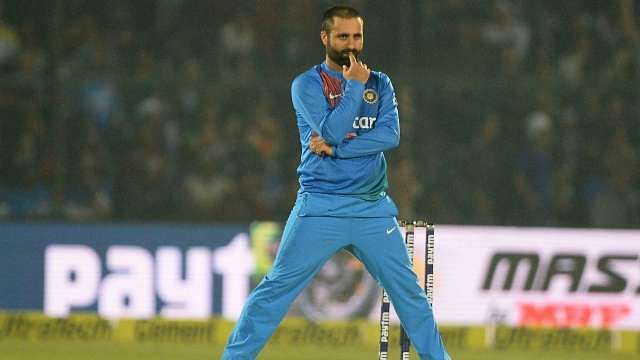
Kohli is now India’s T20I captain too. After spending an entire season with him at RCB, the Delhiite knows what Rasool has got to offer and decided to back him over the in-form pair of Kuldeep Yadav and Shahbaz Nadeem, when R Ashwin and Ravindra Jadeja are given a rest.
Rasool’s story finally seems to be inching towards the fairytale finish, the one where he gets a fair opportunity to establish himself as a regular member of the side even when the senior members are not rested.
And even if he doesn’t, he’ll keep trying.
Bottom line
Parvez Rasool may not turn out to be a legendary international cricketer. He may not play many matches for India. There may be others who are better than him. But his spirit, his courage and his drive will remain unmatched.
He has paved the way for the coming generations of players from the Kashmir Valley to realistically believe that they can play for India. And that will remain his biggest contribution.
Where, in cricketing terms, the Kashmir region was only known for making bats, now it’s known as the place that made Rasool. Whenever the all-rounder walks out to play no matter the stage, no matter the team he represents, he should do so knowing he’s not just a cricketer. He’s a lot more.
He’s a hero.